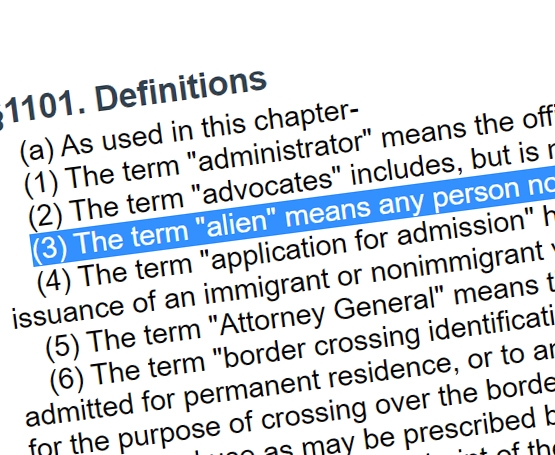
Proponents of open borders have engaged in a decades' long war on immigration terminology to deceive the public about their policy intentions. The most common example is the left's persistent use of the term "undocumented" to describe aliens who have violated U.S. immigration law. This deception is intended to evoke public sympathy that the referenced alien is merely missing the "right" document, implying that the situation is merely a paperwork issue that can be easily remedied.
In fact, nearly every illegal alien in the country is very much "documented" and every single one of them has violated U.S. immigration law by either crossing the border unlawfully (entry without inspection) or entering the country lawfully and refusing to leave when required to do so (visa overstay). For illustrative purposes, a non-exhaustive list of documents that an illegal alien in the country likely possesses includes: (1) a birth certificate from their home country; (2) a passport, driver's license, or some other form of identity document from the home country; (3) a notice to appear (NTA) issued by U.S. immigration officials upon detaining the alien; (4) a visa permitting the alien into the U.S. of which he or she subsequently violated the terms of admission; (5) a fake U.S. passport, driver's license, or other identity document; (6) a stolen U.S. passport, driver's license, or other identity document; (7) an arrest record; or (8) a conviction issued by a U.S. judge. As recently as December 2020, and to the horror of amnesty advocates, during oral arguments in Trump v. New York, Supreme Court Justice Sonya Sotomayor repeatedly used the legally and factually accurate term "illegal alien" to describe someone with no legal basis to be in the country.
But this public relations stunt has proven to just be the warm up act. As my colleague David North has noted, President Biden's mass amnesty bill devotes an entire section to replacing the word "alien" with "noncitizen" throughout the Immigration and Nationality Act. Advocates have (naturally) applauded the effort, with one even describing it as "the elimination of the dehumanizing term 'alien' from the law". This builds off the criticism that Buzzfeed tried to generate when U.S. Citizenship and Immigration Services, the agency responsible for administering our lawful immigration system, undertook a technical update to its Policy Manual in 2019, replacing all instances of the imprecise term "foreign national" with the legally accurate term "alien". Without providing any evidence to back up his claims, an open borders advocate is quoted as describing this update, which was suggested by career agency attorneys for legal accuracy, that it was part of the Trump administration's "effort to make our legal immigration system unfriendly and inaccessible" and part of an "anti-immigrant messaging campaign".
Setting aside the absurdity of terminology making eligibility for immigration benefits "inaccessible", a curious observer may wonder what is this dastardly, hateful word that the U.S. Congress concocted and a U.S. president signed into law? The offender is found at section 101(a)(3) of the Immigration and Nationality Act, which reads, "[t]he term 'alien' means any person not a citizen or national of the United States." That's it. Immigration is a complex issue, but the statutory definition of "alien" is as benign as any word in our laws could possibly be.
Congress has many aspects of immigration policy that require critical debate and analysis, including the levels of permanent immigrants we approve each year, the number of temporary guestworkers allowed in the U.S. workforce, the prioritization of limited immigration enforcement resources, and whether or not we should secure the southern border with a physical wall. Manufacturing a controversy over bland legal terminology smacks of "newspeak" from George Orwell's classic 1984.
The term "alien" is precise, accurate, and in no way offensive. To suggest otherwise is to suspend reality and is not a serious or reasonable position.
